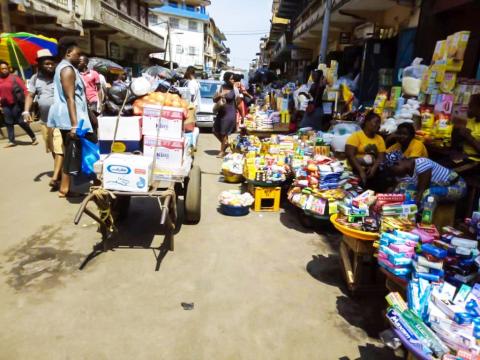By Mabinty M. Kamara
Petty traders in Freetown have complained about the impact of the city council’s latest ban on night trading, which is part of the response to the Coronavirus pandemic.
Some of the traders who depend on night sales told Politico that they feared the ban by the Freetown City Council (FCC) would seriously impact their livelihoods by reducing the “meagre” profits they were making.
On the 20th of March the council released a statement prohibiting petty trading within the municipality between 7pm and 7am. The council said the move was to give its workers more time to clean up the streets as a way of depriving the virus the right environment to thrive.
Sierra Leone remains the only country in West Africa that hasn’t recorded any case of the virus which is ravaging a huge part of the world.
The country is struggling to prevent a spillover from its close neighbors, Liberia and Guinea. Some of the measures being put in place by the government are also meant to prevent the spread of the virus in the event it spills over.
Market places are of major concern, because not only is sanitation in most markets around the city poor, there is also a lot of overcrowding.
“Our priority as a council, moving forward, is that we directly support the efforts of the government of Sierra Leone through the ministry of health and other relevant ministries, to ensure that all residents in Freetown know how to stay safe and mitigate the spread of COVID-19,” the statement from FCC read.
Most markets in the municipality are not enough for the number of existing businesses. As a result, many people sell on the streets at night when those selling during the day have packed up.
This is what Santigie Kamara, a student, does. He sells shoes at night at Sani Abacha Street. He said he had to join his brother in the business to be able to raise enough money to support himself through writing the West Africa Senior Secondary School Certificate Examination (WASSCE) and go to college. Kamara said the ban had limited his chances of realizing that dream.
“We did not decide to sell at night because our shoes are bad or worn-out. We sell at night because we have nowhere to place our business during the day, so we wait until some of the Abacha Street traders pack up and we occupy their space. And it has been working. That is how I have been able to help my brother see me through school to this point,” Santigie said.
“But with this law, it is not easy for us, that is why we came a bit earlier today to hold some few shoes in our hands during the day,” he added.
Fatmata Kargbo, another petty trader at Siaka Stevens Street, is also worried about her “meagre” profit margin. But said if it was meant to keep them safe, she would accept the cost.
“This law has affected us because for some of us it is after 6 PM that we start to get sales. Early in the day, we have vehicles parked in front of our businesses, blocking us from the views of potential customers,” she said.
“We rely on this business to support our families and children in schools, but as long as it is for our safety, it is fine. We all saw what Ebola did to us,” Kargbo explained as she hurriedly parked her goods against the approaching the 7pm deadline.
A spokesman for the city council, Koma Hassan Kamara, told Politico that people couldn’t expect to find their livelihood in convenience whiles the country was preparing to fight a pandemic.
Kamara, who is the Public Relations Officer at FCC, added that this is the beginning of a larger plan to decongest marketplaces in the city.
“We just want to be able to monitor the trading activities and clean the place which we can’t do at night. So, we consulted with the Traders Council to reduce the number of hours. As the situation unfolds, we have plans of spacing the markets places during the day to reduce body contacts and congestion as said by the government,” she explained.
Kamara noted that they were concerned only with petty traders, who fell under the Council’s jurisdiction. She said shops, pharmacies and supermarkets were not part of the ban because they fall directly under the Ministry of Trade and Industry.
Those who sell cooked food like rice or fries have also been allowed to continue with their sales until 10pm, even though they fall under the council. Kamara said the food sellers were exempted because the council realized that a huge chunk of the masses depend on them for their source of daily feeding.
Copyright © 2020 Politico Online








